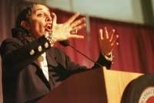The problem is not the canary; it's the atmosphere.
Building on the metaphor of the canary testing the toxicity of air in a mine, the keynote speaker at last Thursday's Dr. Martin Luther King Jr. Celebratory Breakfast, Lani Guinier, recommended that academia adopt new strategies to increase diversity in higher education.
"The experience of women, the experience of people of color and particularly the experience of African-Americans is the experience of the canary," she said. "And the problem has been that we have pathologized the canary and tried to locate the problem in the canary, when in fact the canary is signaling to us a much bigger problem with the atmosphere in the mine that is affecting all of us.
"So the challenge is not to pathologize the canary, not to outfit the canary with a little pint-sized gas mask so that it can withstand the toxic atmosphere in the mine. The challenge is to fix the atmosphere in the mine so all of us can breathe cleaner air."
The Harvard Law School professor was addressing the theme of MIT's 27th annual celebration of the life and legacy of Dr. King, "Confronting the Gap: Building and Sustaining Inclusion." In doing so, she urged educators to abandon overreliance on written tests to predict the potential for achievement -- "the testocracy," she called it -- and to adopt Dr. King's methodology of "taking from the margin to rethink the whole to benefit everyone."
"We are using the testocracy as a proxy for privilege," Professor Guinier said.
She pointed to research that indicates the best predictor of a person's Scholastic Aptitude Test (SAT) score is his or her grandparents' socioeconomic status, and that the issue is really "democratic citizenship."
"We abolished the literacy test and we abolished the poll tax and we abolished many of the arbitrary pre-requisites that had been used to determine who can participate in our democracy," Professor Guinier said. "I think we need to reconsider the testocracy and some of the tests that we are using as gatekeepers."
She did not suggest that testing be abolished. As a teacher, she gives them and pays attention to the grades. Her concern is misuse.
"This is about high-stakes testing that is being used to predict from one domain to another how someone is going to perform in the future," she said. "This is not about how well you did in this particular class based on what it was that I expected you to learn. This is using a test or misusing a test to try to predict someone's future performance."
She concluded with a story about her son, who wanted to be an astronaut when he was eight years old. As a result, their family watched the movie Apollo 13 several times.
"You must remember, if you've seen it, the scene where they summon NASA, the astronauts are in a capsule, they are choking on their own carbon dioxide, there is leakage between a round tube and a square opening and they are in desperate shape -- 'Houston, we have aproblem.'
"Now, the NASA administrator, in trying to deal with this tangible problem, did not say, 'Well, get me the person with the highest SAT scores on their physics or science or engineering tests.' He assembled a diverse group of people with different kinds of expertise. He put them in a room, he gave them a reproduction of everything that the astronauts had on that capsule and he said, 'Now you have to solve this problem by working together.' And they did. And they were able to convert what could have been a tragedy into a triumph.
"I believe if we take the methodology of Dr. King, if we remember the lesson of the miners' canary, that we too can avert what could be otherwise a tragedy and turn it into a triumph," Professor Guinier said.
A version of this article appeared in MIT Tech Talk on February 14, 2001.






